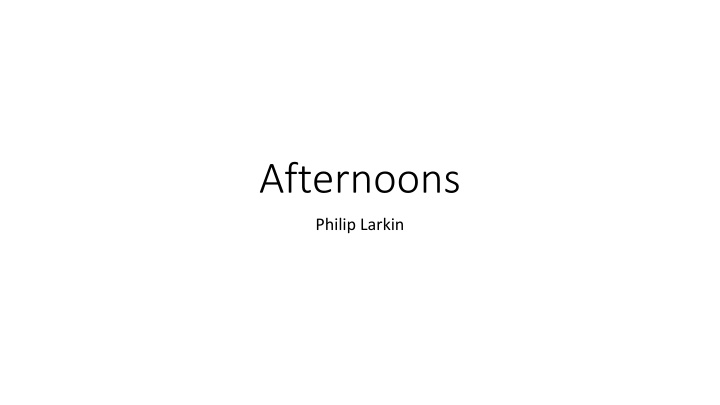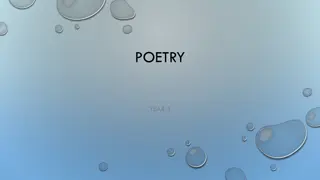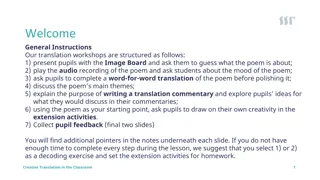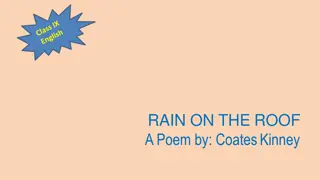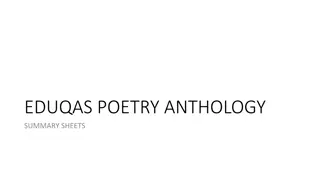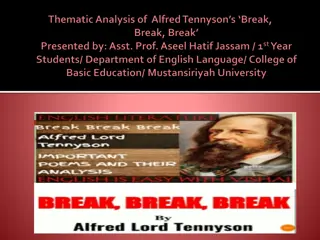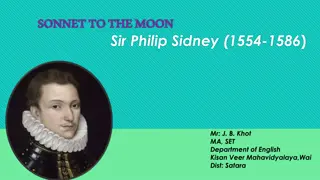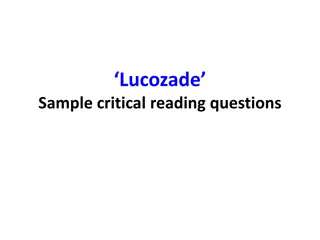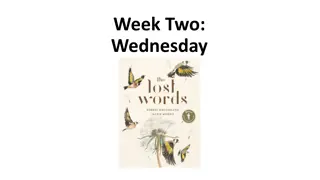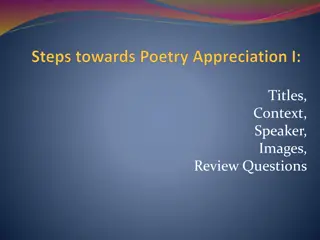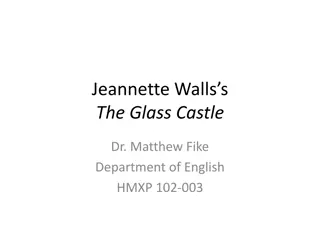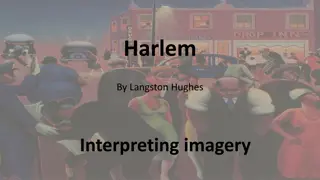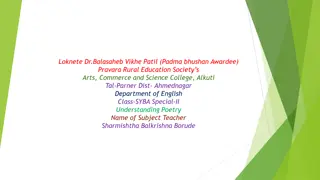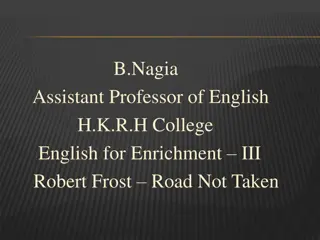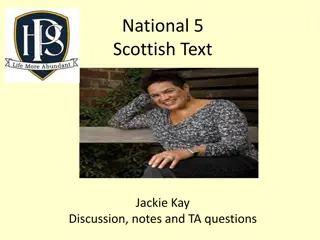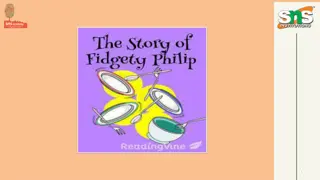Analysis of Philip Larkin's Poem "Afternoons" and its Themes
Philip Larkin's poem "Afternoons" reflects on motherhood and marriage by observing young mothers at a playground. Larkin explores the themes of identity loss, societal expectations, and the passage of time. The poem evokes a sense of melancholy as it delves into the challenges of balancing personal identity with the demands of parenthood.
Download Presentation

Please find below an Image/Link to download the presentation.
The content on the website is provided AS IS for your information and personal use only. It may not be sold, licensed, or shared on other websites without obtaining consent from the author.If you encounter any issues during the download, it is possible that the publisher has removed the file from their server.
You are allowed to download the files provided on this website for personal or commercial use, subject to the condition that they are used lawfully. All files are the property of their respective owners.
The content on the website is provided AS IS for your information and personal use only. It may not be sold, licensed, or shared on other websites without obtaining consent from the author.
E N D
Presentation Transcript
Afternoons Philip Larkin
Philip Larkin Philip Arthur Larkin (9 August 1922 2 December 1985) was an English poet, novelist, and librarian. His first book of poetry, The North Ship, was published in 1945, followed by two novels, Jill (1946) and A Girl in Winter (1947), and he came to prominence in 1955 with the publication of his second collection of poems, The Less Deceived, followed by The Whitsun Weddings (1964) and High Windows (1974). He contributed to The Daily Telegraph as its jazz critic from 1961 to 1971, articles gathered in All What Jazz: A Record Diary 1961 71 (1985), and he edited The Oxford Book of Twentieth Century English Verse (1973).His many honours include the Queen's Gold Medal for Poetry.He was offered, but declined, the position of Poet Laureate in 1984, following the death of Sir John Betjeman.
Afternoons This is a melancholy poem, which reflects on the subject of marriage. The poem deals with Larkin s view on young mothers watching their children playing in a playground and he concludes that marrying young leads to the mothers losing their identities. Larkin s description of young mothers taking their children to a playground seems normal but the narrator s point of view on life is expressed. What seems like an ordinary, everyday occurrence highlights the theme of change and how it cannot be avoided, like the passing of time.
Read the poem Think about and answer the following: At the beginning of the poem, what does Larkin observe describe what he sees List the chores which the young mothers must complete in a day and explain what Larkin is saying about their lives What might the message of Larkin s poem be? What is he saying about motherhood/marriage?
Comprehension Questions 1. During what season is the poem set? Why might this be significant? 2. Who does the poem focus on in the first stanza mother or child? 3. List as many skilled trades as you can 4. In the final stanza, what are the children doing?
Techniques Contrast Word Choice Enjambment Parenthesis Alliteration (sibilance) Symbolism Juxtaposition
Discuss and answer the following questions: 1. What is the significance of In the hollows of afternoons ? 2. What is meant by Behind them, at intervals/Stand husbands ? 3. What does the line (But the lovers are all still in school) suggest? 4. What does Larkin mean when he says the women are To the side of their own lives ?
Language questions 1. Why is the poem entitled Afternoons ? 2. Explore the connotations of the following words a) summer is fading b) New recreation ground c) Young mothers assemble d) Hollows of afternoons e) At intervals f) Their beauty has thickened g) Something is pushing them/To the side of their own lives h) so intent i) expect 3. What do you think of the collective noun in the following phrase: An estateful of washing 4. Do you find the language in the poem positive or negative? Explain your answer fully with reference to the poem 5. What image is created in the lines: At swing and sandpit Setting free their children
Structure 1. Why is the season of autumn important? 2. Summarise the content of each stanza 3. What tense is the poem written in and what impact does this have? 4. What might you say about the rhythm and rhyme scheme? 5. In the second stanza, how does Larkin use prepositions? What is the effect? 6. How does Larkin use juxtaposition? 7. Why are the words Our Wedding capitalised? 8. Can you find any links between the structure of the poem and the structure of life?
Annotations Stanza 1
Title - Afternoons Women in the afternoon of their lives Something that is always the same inevitable Something ordinary
Summer is fading Seasons used to represent (symbolise) stages of life Summer no longer at its peak like the women Metaphor for progression of life Summer is usually a happy time but it is coming to an end sense of losing A sad tone is created fading - gradual, don t notice fading growing dimmer less beautiful, vanishing like the mothers beauty
The leaves fall in ones and twos Sign of autumn Not always noticeable Gradual, continual decay
From trees bordering bordering stop escape? Mothers are also bordering the children are protected in the middle
The new recreation ground Newly built, ordinary, fun for kids new new stage recreation children, recreation of species?
In the hollows of afternoons Assonance highlights the emotions not busy, a brief rest The mothers are unfulfilled hollows emptiness, adds to the mood of loss
Young mothers assemble young not long out of school, don t have youthful lives mothers assemble formal connotations, routine, school, everyday, regimented, no pleasure
At swing and sandpit Sibilance gains momentum energy and vigour of children
Setting free their children. setting free independent, don t need mothers so much Enjambment of stanza 1 reinforces how age can creep up and how dull afternoons seem to drag on
Annotations Stanza 2
Behind them, at intervals Women s eyes on children Women in front, marking territory? Are the husbands supporting them? Or not important? Effects of passage of time Physical and emotional distance, only see them at certain times no romance
Stand husbands in skilled trades Boring, dull yet steady Working class Not professionals
An estateful of washing (estateful amount of) Ordinary, humdrum tasks now fill their lives Symbolises the domestic drudgery of their lives estateful an uneventful place to live
And the albums, lettered Symbolic of hopes and dreams
Our Wedding, lying Children are important now Happened recently? lying discarded, pun? Promises were a lie?
Near the television: Stories on TV/entertainment, like it happened to someone else TV gets more attention than them
Before them, the wind Wind of change? Weather changing
Is ruining their courting-places Disturbed by wind Enjambment suggests life (unbroken cycle) goes on, its changed for them but new generation is discovering it
Before them, the wind Is ruining their courting-places Women see their past slipping away
Annotations Stanza 3
That are still courting-places Repetition doomed to repeat parents lives The courting-places are no longer for the mothers
(But the lovers are all in school) Parenthesis brackets remind us that the kids aren t at that stage yet The next generation are learning (about life?)
And their children, so intent on Children s demands are disrupting their lives intent single-minded about learning/knowledge
Finding more unripe acorns unripe acorns innocent, unaware of what is to come Will grow into an oak still young Symbolises search for knowledge and growth Child to adult takes time but flies by
Expect to be taken home Children are demanding and mothers feel obligation to them
Their beauty has thickened No longer young Lost their figures/youthful beauty Weightiness, rooted to the spot
Something is pushing them Not specific is it the children? pushing forceful, no control A cynical tone
To the side of their own lives To the side - Women are no longer the focus, they are looking on own lives no real control over the direction, focus only on family
Contrast between old and new. Newness is an unattractive idea in the poem, it s a reminder of what the women find slipping from them. The new makes them feel old and different Present participles (-ing) indicates the gradualness with which this change is creeping over them. It also appears continuous
Critical Essay Question Choose a poem which creates a mood of hope or despair or mystery. With reference to appropriate techniques, explain how the mood is created and discuss how it enhances your appreciation of the poem as a whole.
Plan Vivid sense of time/place to highlight central concerns of poem Intro TART + BO P1 playground P2 the house/estate P3 seasons 2 quotes per paragraph Conc - TARRT
